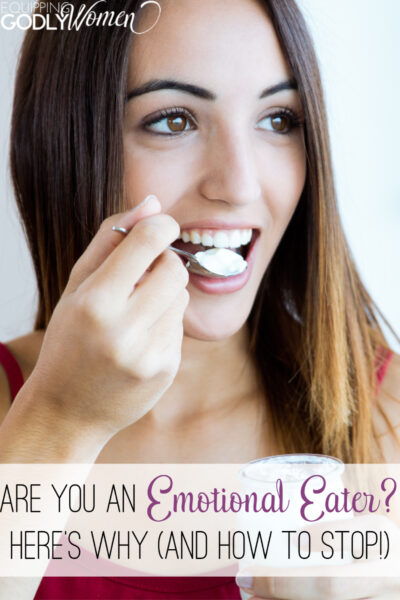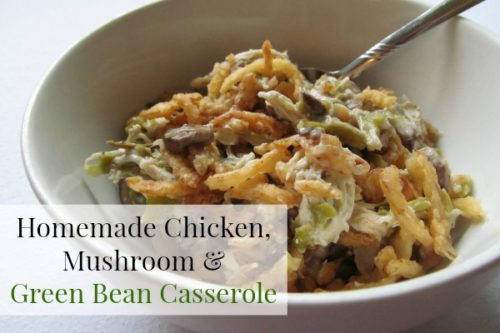Are You an Emotional Eater? Here’s Why (and how to stop)

Hello, my name is Brittany and I’m a stress eater.
It’s not that my food choices on a whole are terrible.
I have no problem passing up cake at a birthday party and I don’t really mind being hungry if dieting.
But when I’m stressed? Give me alll the food.
Can you relate? Are you an emotional eater too?
It’s fairly common.
In fact, according to the American Psychological Association:
“Thirty-eight percent of adults say they have overeaten or eaten unhealthy foods in the past month because of stress. Half of these adults (49 percent) report engaging in these behaviors weekly or more.”
While a Harris Poll found:
“nearly 8 out of 10 women… in the United States suffer from food guilt”
That’s a LOT of women who are stress eating, and then feeling bad about it afterwards!
Perhaps you’re one of them?
The good news is: Emotional eating isn’t ALWAYS bad.
There’s absolutely nothing inherently wrong with sneaking a little afternoon pick-me-up in the form of a cookie or candy when the kids are driving you bonkers. And there’s nothing wrong with diving into a carton of ice cream after a particularly long, hard day.
I’m a huge fan of warm cookies and milk, myself. ?
The problem happens when you become so accustomed to using food to “heal” your emotions, that you regularly turn to food first — even when you know you shouldn’t — because you’ve come to depend on that food to help you.
Because when this happens, it can turn into idolatry.
Emotional Eating = Idolatry?? Seriously??
Okay, stay with me here…
Let’s start with the definition of idolatry.
Merriam Webster defines idolatry as:
- the worship of a physical object as a god
- immoderate attachment or devotion to something
In other words, worshiping something as though it were a god, or putting something or someone else in God’s rightful place.
And while we Christians don’t talk about idolatry very often, we are far more guilty of it than most of us realize.
Now, of course, not all emotional eating is idolatry. It’s fine to enjoy the good foods God has given us.
But for some of us, that enjoyment can easily cross the line into idolatry if we’re not careful. When we consistently turn to food for our comfort, healing, and happiness, instead of turning to God.
And that’s a problem.
John Piper lists Four Signs Food Has Become an Idol on his website, DesiringGod.org:
- We become indifferent to the harmful effects that the food is having on the temple of the Holy Spirit, our body.
- We become indifferent to the way we are stewarding our money as we spend unwisely on wrong foods.
- We start using food as an escape from our problems and a medication for our sadness or our misery or our discomfort.
- We stop enjoying food as a way of enjoying God. We stop tasting the goodness of God in the goodness of the food, and we start replacing the goodness of God with the goodness of the food. This is gluttony.
So… that leaves the question: What is your relationship with food?
- Is it something you enjoy as a good gift from God?
- OR do you consistently turn to food for comfort and emotional support — to the point that it has become a compulsion and you feel powerless to stop?
“”I have the right to do anything,” you say–but not everything is beneficial. “I have the right to do anything”–but I will not be mastered by anything.” — 1 Corinthians 6:12
*This post contains affiliate links, which means if you make a purchase, I may make a small commission at no additional cost to you. This helps cover the many costs of running this site and allows me to help provide for my growing family. Thank you!
Two Great Books for Christians Dealing with Emotional Eating
Below, I have 4 great tips to share for you to help you finally kick this emotional eating for good. But first, I wanted to share two really good books I have read that deal with the topic of emotional overeating from a Christian perspective.
I really enjoyed both of them, and if this is something you struggle with, I think you really will too.
Made to Crave: Satisfying Your Deepest Desire with God, Not Food
In “Made to Crave” New York Times Best-selling author Lysa Terkeurst makes the case that God made us to crave… but that these cravings are designed to lead us to Him, not to food. Honest, vulnerable and full of very relatable humor, “Made to Crave” will show you how you can use these same cravings to draw your heart back to God.
Learn more about “Made to Crave” here.
Full: Food, Jesus, and the Battle for Satisfaction
In “Full,” Asheritah Ciuciu gets super honest about her own struggles food fixation, and invites other women to do the same. She not only helps explore what’s really going on in your heart when you can’t seem to stop eating that cake, but gives you practical steps to overcome your struggles as well.
How to Find Freedom from Emotional Eating
Okay, those two books above (“Made to Crave” and “Full“) provide a great, in-depth look at what’s really going in your heart when you allow food fixation to take over God’s rightful place in your life.
Now, let’s get into some super practical tips you can take to stop your emotional eating for good.
1. Identify the Reason
Before we start tackling how to help you stop emotional eating, it’s helpful to really understand why you’re behaving this way in the first place.
After all, chances are there is a root cause to the issue, and if you don’t address this deeper cause, you’re only going to be putting a band-aid on a deeper wound.
So what’s the real reason you overeat? What causes it?
Pray that God would give you knowledge, wisdom and insight, and then ask yourself:
- How do I typically feel immediately before, during, and after binge eating my favorite foods?
- What thoughts do I tell myself immediately before, during, and after binge eating my favorite foods?
- Is it a lack of self-control on my part, or am I trying to mask a hurt?
- Are there any past hurts or wounds in my life I haven’t dealt with that could be contributing to my overeating?
- Am I angry with anyone or about anything?
- Do the foods I tend to over-indulge in now have any ties to my past? (For example, did you used to go out for ice cream with your dad or make cookies with your mom as a little girl?)
- Have I always struggled with overeating, or is it recent? When did it start?
- What else was happening in my life around the time I started overeating?
- How do the people around me relate to food? Do they encourage me to “eat up,” or is it just me?
These are just a few questions to hopefully help you start thinking in the right direction.
Definitely spend some time with God in prayer though, asking Him to reveal to you what’s really going on and why.
2. Identify Your Triggers
If, after spending some time in prayer, you can’t pinpoint one specific hurt or problem you may be masking, that’s okay. It may simply be that your body craves, or has come to depend on, a rush of sugar for an extra dopamine hit.
This article on Sugar and Dopamine explains what happens on a hormonal level when you eat sugar:
“So, our brains still perceive sugar as beneficial and release huge amounts of dopamine when we consume sugary, high-calorie foods. In the long term, this can mimic the effects of addiction and create high tolerance and cravings for sugar. Furthermore, can even lead to withdrawal when we cut it out of our diets. That’s why it can be so difficult to resist the urge to consume sweets like candy and cake.”
So, instead of figuring out the root cause, you may simply need to figure out your “trigger.”
In other words, what typically happens before you overeat, that “causes” you to overeat? Are there any patterns you can notice?
For example:
- Types of Food: Do you overeat all foods, or just one certain type?
- Time of Day: Do you typically reach for sweets in the morning, afternoon or evening?
- Specific Places or Events: Do you often overeat at pot lucks, birthday parties, or when you’re alone?
- Your Physical Body: Do you typically overeat when you’re tired, when you’ve been restricting calories, or during a certain time of month?
- Other People: Are there certain people you typically overeat when you are (or have been) around?
Take some time to really think and examine the next time you overeat or are tempted to. What patterns do you notice? What’s going on?
3. Eliminate or Reduce the Triggers, When You Can
The next step, of course, is to eliminate as many of these triggers as you can.
So, for me, I tend to overeat when I’m up late writing by myself — especially when it’s something difficult or stress-inducing I’m writing.
In this scenario, my triggers are: 1. I’m tired, 2. I’m stressed, and 3. I’m alone
So, possible solutions for me would be to: 1. Write early in the morning instead of late at night, 2. Do more pre-writing and planning and/or allow myself more time so I’m not so stressed trying to figure out what to say and how to say it on a deadline, and/or 3. Write at the library, where food isn’t allowed.
How about you? Could you…
- Remove all junk food from the house so it isn’t there to tempt you
- Meal plan/prep in advance so you have plenty of healthy, easy options on hand
- Go on a sugar fast to reset your taste buds
- Have a healthy snack before the get-together so you aren’t as hungry
- Find hobbies and activities to do with your friends/family that don’t involve eating
- Take a walk or listen to some music to reduce your stress level before you start overeating
Sure, these won’t address the spiritual aspect of overeating. (“Made to Crave” and “Full” will help you do that)
But they are simple, easy steps you can take to make it easier on you.
4. Determine a Better Response
Unfortunately, there will always be some triggers you can’t control or prevent. While you can take steps to reduce your stress, you’ll never be able to get rid of it completely.
That’s why you ALSO need to determine a better response in advance.
Fill in the blanks: “When ___(trigger)_____ , I will ____(better response)_______.”
The first blank is your trigger. So something like:
- I am stressed
- I am tired
- I am tempted to overeat
- My kids are driving my crazy
- My mother-in-law makes a rude comment
- My boss piles on the work
The second response is the action you will take instead of overeating. So something like:
- Go for a walk
- Put on upbeat music and have a dance party
- Call a friend
- Eat an apple instead
- Take a nap
- Anything that meets the same need, but in a more constructive fashion…
Now, if you do all four of these steps, will it prevent you from every overeating again?
No, probably not.
But it really can help you to break that addiction and start making better choices on a more consistent basis.
And don’t forget to check out “Made to Crave” and “Full” as well – for even more help and advice on the spiritual aspect of overeating and food fixation!
Do you struggle with emotional overeating? What is your most common trigger?








I know this article is for me as God has recently been talking to me about my eating habits. I pray for grace to get through this.
This is definitely an area where I am struggling. I have eliminated sugar and white flour to reset my cravings, but still need to deal with the emotional triggers. I have read Crave and loved it. I really like your suggestion to spend time in prayer asking God to reveal the source is a great idea (why haven’t I done this already??). Maybe I have been afraid to “rip the band-aid off”. I also struggle with stress eating when writing so I will try your suggestions to head off the stress before I am tempted by the chips or cookies. And I love the idea of planning out substitutions for my habitual eating. Just need to spend some time thinking about those triggers. Thanks for the post!
I’m so glad I gave you some ideas to try!